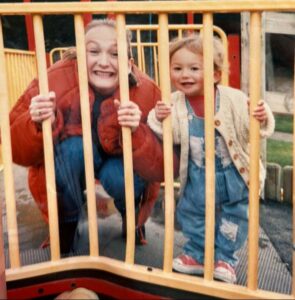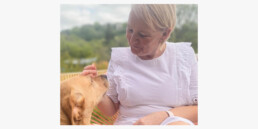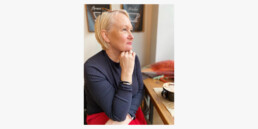A guest blog by Sarah Hussey.
The day that Holly got her ADHD diagnosis was bittersweet to say the least. She was 28 years old and we were in the Psychiatrist's office together after an intensive assessment process that went from her early years right up to the present day. We had arrived at the place together after Holly had admitted being really struggling (not for the first time) with life in general and had returned to significant self-harming. This diagnosis has changed our outlook on life but would have been far more useful 15 years ago. I doubt very much that she would have been diagnosed before her teenage years. As her mother I felt both relief that we had finally got there and guilt that it had taken so long. As an educator all I could think was ‘how the F**K did I not put two and two together and make four’. And therein lies the problem for women with late diagnosis ADHD; all the health and education professionals involved with you over the years (and sometimes your own family) put two and two together and make five, six or even seven – but never four!
When I began teaching in 2000, ADHD was something that only boys were diagnosed with, and often it was thought that chaotic/negative parenting played a central role (nonsense of course!) These boys were often impulsive, loud and caused daily disruption in your class, and this is still very much how it presents in boys today. Thank god we are better educated now but I wonder how many girls in my classes were struggling with ADHD, but because it presents so differently in females are now only getting the support they need?
In Holly’s early life there were factors that would not have led you to an ADHD diagnosis initially; she had a traumatic birth which led to her being in NICU and the first nine years of her life was spent in a home where domestic violence and alcohol and drug abuse was the norm – something we have all taken a long time to process and accept.
As a baby she never slept for longer than two hours, night or day! I did not know whether I was coming or going for the first two years of her life. She slept with me every night and only managed one night in her cot, and she screamed herself to sleep whilst I cried (the health visitor said I had to be tough!) Incidentally, when her sister was born three years later, she slept through the night at ten days old. I had to keep checking that she was breathing!

Holly was a curious child, her speech was great and she read at an early age – her love of books came from her maternal Grandma. She loved to learn and could retain so many facts and figures about things that she was interested in – if she wasn’t interested, forget it! She liked to please at school and was compliant and followed the rules. At home, she was a live wire, she wanted to do everything. At one stage in her school life we were running her to events every night of the week and at weekends. She played football, cricket, netball and she was part of an athletics club and ran long distances competitively. She rode horses, and surfed and swam – in fact she swam the Solent! She still runs most days and has competed in marathons and triathlons. Once she began High School at 13, she joined the gym and went twice a day most days. She was also very academic and took her studies very seriously. It was also obvious that she struggled with relationships with others and her own view of herself. We really struggled to understand how her mind worked – not long ago she told me that her head was ‘so loud.’
During her teenage years Holly struggled with her mental health – she lost a lot of weight and was not eating anywhere near enough to fuel the daily exercise she was undertaking. She was diagnosed with Anorexia and referred to CAMHS. Over the years there have been many suggestions and diagnoses from various professionals – Anxiety, Depression, Bi-Polar Disorder and Anorexia have all been attached to Holly and all with different treatments including medication. None of these ever seemed to make things any more understandable or manageable for her or the rest of the family. Then it was time for university, and this is when she really began to unravel. Managing life was too difficult for her and she was completely overwhelmed all the time and like so many young women in her position she self-medicated with whatever helped her at the time. Believe it or not, despite how hard it was and still is, she has a nursing degree and is now training to be a doctor. Her resilience astounds me.
Holly is one of many young women who have been wrongly diagnosed for years. It is a sound argument that it is because we knew less about ADHD in women 10 or 15 years ago – but we know now and have to do better! For a start, waiting lists are so long on the NHS you may as well give up before you even start – we were lucky enough to have family support us to go through the assessment privately. However, this in itself comes with the fact that some people think that if you pay for a diagnosis then of course you will get it! (I don’t think any of us, including Holly, wanted her to have ADHD). Educators need training to recognise the signs of ADHD in girls so they won’t have to struggle for so long. Research now shows that if young people are safely medicated earlier on in life, they will be less likely to use drugs/alcohol/sex/crime to self-medicate – surely this is what we want for our young people?
Holly does take medication to help the symptoms of her ADHD – it took a while to get the dosage right and for her to accept the side-effects, which are not pleasant. She can choose when she can have a break from them and knows that they do not mix with alcohol – she hasn’t drunk for months. We have both been on a journey and have read lots of books together and researched how ADHD is different between males and females. As a mum, I hope that I understand her better and try very hard not to let things that would have annoyed me before worry me – like the inability to see any of the mess she creates around herself or the difficulties she has when plans change. I sincerely hope that she understands herself better and accepts that there are some things in life that she will always find hard. The one thing that the Psychiatrist said that has stuck with me, is that he was utterly amazed that Holly has succeeded with so many things in her life considering the significant impact ADHD has on people. (I do intend to follow up this blog with others about ADHD and how it presents in females, but if I continue writing now it will become the first chapter of a book and not a blog!)
I have written this with Holly’s blessing and I am hoping that she is also going to write a blog telling us all what it is like for her.
I am incredibly proud of how she has survived this journey and is now beginning to thrive – it has been a hard road for her and everyone that loves her and I am grateful to you all for showing her patience and understanding.
Incidentally, ADHD is thought to be genetic and the more I have learned about it and myself the more I believe that I too have ADHD. I have been referred for an assessment by my wonderful therapist but on the NHS – I am in no hurry as I have managed it for this long. People often comment on how alike Holly and I are in many ways, so ADHD will become something else that we share.
28th August 2023
A guest blog written by Julie Cassiano. Follow Julie on X (Twitter) @julie_cass1.
Firstly, a huge congratulations on securing your first headship. I could not be happier for you. You must be feeling excited, nervous, eager, apprehensive and every other emotion there is. Do not worry, this is normal. I hope this blog supports your transition into headship.
Confident not arrogant
You may start to self-doubt your capability, allowing your mind to play tricks on you… please stop! Remember it is not your job to assess YOU, thankfully those who appointed you and submitted a reference selected YOU, so, newsflash, you are the right candidate! It is important from day one your behaviours demonstrate to others (all stakeholders) you are confident to LEAD but without arrogance.
Why is this important?
Believe it or not your stakeholders want you to be successful! Any employee who has worked for a leader who struggles to lead will know this makes the job far less doable and enjoyable. They will want you to show up as a leader who can continue their school’s journey from whatever their starting point. So, what does confident and able to lead mean? It certainly does not mean you turn into Sharpea from High School Musical (just watched with my daughter) – bossing everyone around and throwing tantrums when deadlines are not met – oh no, no! It’s about:
- Calm and patient – take time to reflect before acting
- Active listening
- Accepting feedback
- Bringing people together to evaluate and problem solve
- Creating independent leaders
Confidence is having the strength and wisdom to know it isn’t about you, it’s about empowering those you lead.
Coaching
I was fortunate enough to have two coaches during my first term, yes, two! I had an informal coach, someone who knew me well and had seen my career develop over the years. The second was formal with planned slots & agenda. Both offered different expertise. I truly believe I needed both for differing leadership challenges.
Self-care
Know the job is never complete. You have made it to headship so time management should not be an issue, but prioritise time for you and your loved ones. This is as important as blocking out time for meetings. I would like to thank my ten year old for assisting me with this. She demands Mum time which I appreciate. During the holidays, aim to switch off or drastically reduce the number of hours you work. It really does make you more effective. I understand that work life balance looks different for everyone (flexi-working) – for some, working some of the holidays shortens the working day on return. For others, they need to shut off for the whole holiday to be effective on return. Just make sure you do switch off.
Ofsted
I cannot discuss Ofsted without first paying tribute to our colleague Ruth Perry. The education community was shaken by this story. I still feel immensely sorry for what happened. Condolences to her loved ones.
As Ofsted or some form of independent inspection will always be a part of school accountability and it is one of the most talked about aspects of headship, I will share some advice and tips I took onboard. Please note, I am not stating that those who have not had a positive experience approached it incorrectly – I am simply sharing what I found worked for me in my context.
Every headteacher will face different Ofsted situations. For instance, some may be leading a school which has recently had a ‘good’ judgement whereas others may take on a school which requires improvement, awaiting a revisit. Another common scenario is leading a school where the last inspection was very positive but your recent evaluations cannot evidence this. Therefore, there is no one size fits all approach but some of the following worked for me.
Avoid absorbing other people’s perceptions. They are other school’s experiences and anxieties that do not need to become yours. Do not judge your school based on information from another inspection and second-hand information.
Consider preparing for Ofsted the same way you prepare to attain a qualification. Action plan how you will evidence your continued success against the framework. RAG rate as you go along – your SEF. Evidence cannot be data alone. It must be something concrete that can be seen/heard/experienced during the inspection. Utilise your staff’s knowledge as they are your experts. Encourage and welcome their feedback. Bring them with you. If they are involved, they will deliver.
Ensure Ofsted runs alongside your school’s SDP/Values or mission statement. Your Ofsted evidence should complement school improvement never dominate it. Never say or do something because you assume it is what Ofsted want to see. Everything must be about your children and their needs. No one is motivated by ‘Ofsted is approaching so...’. Ofsted’s framework and The National Curriculum is loose enough for you to be able to do this. This limits workload.
A typical FEAR I want to address. What if I get that unfair inspector who will not listen to reason? Personally, I am only ever concerned with my own personal experiences. I have not met that inspector. This is not to say they do not exist…I am saying I will only fear what I have experienced. As leaders what do we do if something is a threat…plan for it! Action plan for all possible threats. I hear you scream – oh no but planning for it will add to my workload. This is where networking comes in.
Networking
There are pros and cons to social media. We have already touched on one of the difficulties. Some members will need to use it to air out their leadership difficulties as they are asking for support. When entering the role, reading these can make less experienced Headteachers feel anxious. Remember all contexts are very different. Only assess situations based on what is happening in your setting. In my opinion, the pros to social media well outdo the cons. There is no problem or policy that has not already been solved or created. You must not reinvent the wheel. Spend your first year attending as many webinars as possible conversing with a range of other headteachers in a range of differing settings discussing common challenges and solutions which you can edit. I have found that headteachers are the most approachable people who are always willing to share their expertise. It honestly is the key to success. Personally, I use Education Roundtables @EdRoundtables, Heads Up for Headteachers @HeadsUp4HTs, @Headteacherchat and @PaulGarvey4 (these are all X - aka Twitter - handles). The former two help smaller accounts by retweeting your Qs/challenges if you tag them into your tweet.
Final point
Go thrive and share your success on social media. Do not be shy to tell the world your school is flourishing. I do not believe bragging is a negative thing. It is my favourite read on social media. Others cannot shine if they do not know what is possible. No sports person is ever shy to share their achievements so why should we be.
21st August 2023
- What’s it really like to work in schools today?
- How do the ‘critical incidents’ in our lives and our work influence our sense of identity and our values and what impact do they have on our likelihood of surviving and thriving in the profession?
- Those moments – or chains of events - we remember with multi-sensory clarity – how have they affected our confidence, our effectiveness at work, our close relationships, and our perceptions of the teaching profession?
- What brings us a sense of reward and fulfilment and results in joy, purpose and satisfaction?
- What bends – and threatens to break us a humans and as educators?
- What lessons can we learn as professions and what lessons can the wider profession take from our stories?

These six ‘little’ (!) questions form the heart of the new book I’m embarking upon for Sage Education. With this new project, I'm building upon my doctorate on balancing teaching and parenthood and my two books, How to Survive in Teaching and A Little Guide to Teacher Wellbeing and Self Care (with Adrian Bethune of Teachappy). Like all my work, it is underpinned by pragmatism, experience, stubborn optimism, and the premise that, however lonely this job can sometimes feel, we are not alone. It will be painstakingly research-based but infinitely accessible over a quick coffee in the staffroom, and it aims to provide practical ways forward for individuals and schools and ultimately have a positive impact on our noble and beleaguered profession.
I want to collect your stories - of key incidents or chains of events that had a profound impact on you - from the apparently incidental to the searingly life-change. I want to amplify your voices – those of the new teachers, the leaders, the teaching assistants, the business managers and all the staff working in schools and share your stories (all of which will be fully anonymised) in order to shine new light on the lived experience of working – hoping to work, or having worked – in schools.
Interested in the findings? Watch this space – I’ll be sharing nuggets and thoughts through the writing journey here and on my Twitter, Instagram and LinkedIn pages.
Would you like to contribute? I’d love to have as big a range of voices as possible, and as the project progresses, will be requesting stories related to specific themes or from specific voices in order to ensure, as far as possible, inclusivity. I won’t have the scope to tell every story in detail but every story will form a piece of the mosaic and the themes you illuminate will all influence the book. Follow this SurveyMonkey link to share your story:
As ever, it is a huge honour and a huge privilege to represent the voices of fellow educators.

26th July 2023
We Can Never Be Employers of Choice Until We Promote Being a Sector of Choice
A guest blog by Helen Stevenson. Helen (a former teacher and MAT Executive Leader) is the Founding Director of Satis Education which deals with recruitment at all levels across the schools’ sector. Satis Education are market leaders in MAT executive leadership recruitment. Follow Helen on Twitter.
There’s a huge focus across the education sector about how we become employers of choice. However, I don’t believe we can ever become employers of choice until we operate in a sector of choice.
As education leaders, before we can begin to talk about how to become a sector of choice or employer of choice, it’s really important that we all understand what, in the 21st century, we are perceived to be.
We live in an increasingly consumerist society and as such education, like many other sectors, is viewed as a service industry.
We don’t make things, we don’t sell things – we provide a service. And to provide the best quality service we need to employ the best 'service providers'. With the current crisis in recruitment and retention, we need to do everything we can to encourage a new generation of 'service providers' to join us.
When when it comes to promoting the education sector as a sector of choice, we all have two choices: We can be an Eeyore – the eternal pessimist, or we can be Forrest Gump – the ultimate in glass half full.
Unfortunately, in recent years, and certainly coinciding with an increased use in social media, I fear there are far too many Eeyores taking to social media to bemoan our wonderful profession. I don’t believe in 'naming and shaming', so I purposely won’t provide examples.
However, as someone who spends a lot of time on social media for professional reasons, please believe me when I say if you are connected to people within the profession, it won’t take long before you come across numerous posts from education staff complaining about their job, directly or indirectly.
How do you feel about this?
What impact do you think it has potentially to new entrants to the profession?
But before I offend anyone I want to make one thing very clear, I’m not for one second saying that working in the education sector is easy. There are a number of issues that need to be tackled – the most pressing of which is workload.
And I for one would love to provide the silver bullet that means we could rid our colleagues of overwhelming workloads in one go – sadly none of us can do that.
The challenge of teacher workload is not one that will be resolved overnight – it will take school leaders collectively and persistently knocking on the doors of those in power and those who would be in power before anything is done. Together we are stronger, together our voices are louder, together we become a crowd and are more difficult to ignore.
But for the time being we can also be relentless in coming together to promote the positives, as well as seeking to address the negatives. Building the reputation of the sector will allow us to try to do something constructive about the recruitment and retention crisis ourselves.
In preparation for a presentation I gave at a conference recently, I contacted some colleagues and asked why they had chosen to work in education. And without sounding like I’m presenting Family Fortunes their top answers included:
- It’s more than just a job – you get the chance to make a difference
- No two days are the same – it keeps you entertained
- You become not just a teacher but a lifelong learner
- It’s generally a secure profession – a job for life if that’s what you want
- It’s a profession that allows you to be flexible in terms of where you choose to live and work – your qualifications and skills are recognised nationally and internationally
Now I have to say I don’t think that’s a bad list... it contains a great balance between altruism and personal gain.
If we let the Eeyores dominate we’ll reach a position where we’ve become part of the recruitment and retention problem, by promoting a narrative that puts people off joining the education sector.
I believe it’s incumbent on us all to accentuate the positives associated with the profession, in an attempt to ensure the sector becomes a sector of choice.
We are in charge of our narrative – let’s make it a positive one.
Clarity, Connection and Coaching
Dr Emma Kell in conversation with Sarah Hussey. Reflections on her recent health scares, tips for current school leaders and the power of coaching.
Possibilities and Perspective
A guest blog by Sarah Hussey.
Possibilities and Perspectives or What You Get When You Begin to Heal.
My little blog, How Headship Broke My Heart, was viewed over 400,000 times! It connected me with all sorts of wonderful people, and I even appeared on the local news! So, for anyone who is interested, here is an update from my current position in a brave new world.
As I write this, I am sitting on a blanket outside a beach hut close to where I live on the Isle of Wight. It is a Tuesday, term time and 2 o’clock. I am calm and I am breathing. It feels alien and amazing all at once. I am not in front of a screen (I am handwriting in a notebook), and my phone is on silent. I am calm and I am breathing. I do not have an emotionally dysregulated child (or two) with me, building Lego to calm down (neither do I feel the need to explain this to a member of staff who perceives this to be a reward!). I am calm and I am breathing. I am guessing that my blood pressure is fine, and I have a distinct and welcome lack of pains in my chest, head or arms and no sign of overwhelming feelings of anxiety. I am calm and I am breathing.
I am also very lucky.
It has been six months since the cardiac events that hospitalised me and scared myself and my family to distraction. Six months since I admitted to myself the impact that headship was having on my physical and mental health. I am still taking extensive amounts of medication daily and cannot do everything as ‘full on’ as I used to. I know I cannot go back to headship and stay well, and I am still waiting on a decision about ill health retirement (patience has never been a virtue of mine). On reflection though, I am not just lucky, I am lucky to be alive.
During the past few months, I have started to heal, and I have realised much about our education system and about myself. I maintain that the system is broken and serves neither pupils or school staff. It has slowly dawned on me that I am just one person, and that I cannot and should not do the job of five. And I finally recognise that I deserve a ‘good life’, but that doesn’t mean I can’t care and support others along the way.
Don’t get me wrong – I miss the school community deeply. It is a wonderful concoction of families and staff that I have invested my time and emotions in. I miss contact with the children, cuddles, jokes, comments about my outfits and, of course, the joy that good education brings them. I have learnt that I thrive on human contact and interactions and on some days I feel the loss of them.
However, there are many, many things that I do not miss. In pole position is jumping through hoops for an invisible inspectorate. Followed swiftly by the absolute ridiculousness of testing children for government league tables and allowing them to feel the pressure of these nonsense exams! After considerable rumination, I think that my third position would go to the daily difficult conversations and conflict that now makes up a large part of the headship role. I could go on…
For weeks after I was signed off, I didn’t know who I was – I had lost my sense of purpose. But over time I started to return to myself and remember who I was before I broke. I naturally have days when I am anxious about my heart health. I suffer with angina quite regularly and although I know how to treat it and what to avoid, sometimes I worry that the pain will turn into something more sinister. I have a wonderful therapist, who quickly identified that I have trouble slowing down and want everything done immediately (there has even been some discussion about ADHD – who would have known?). Her services are provided by the wonderful NHS, free of charge! And amazingly, my internal monologue telling me what a failure I am only pipes up occasionally and is no longer on a permanent loop!
If you are still reading, well done – stay with me as this is the important part! During the healing process I have been blessed with two life affirming things – possibility and perspective. I have possibilities stretching out in front of me. I am training to be a performance coach (with NLP), and this is teaching me valuable lessons about life and how we approach it. I am excited/terrified about supporting others to gain clarity and reach their goals. My mind is working overtime, ideas jumping about. Could I write a book? Train others to coach or teach? Run a cake shop that sells books? Become an influencer? A stand-up comedian? A pub landlord? (Okay I agree not all of them are sensible ideas!) But it is time to set some new goals, use my skills in a different but not less important way and how blooming exciting is that?
As for perspective, it is a game changer! All of the terribly important things that kept me awake at night, that I wanted to do better – they are no longer important to me. I did my best and that was enough. When you are in the midst of a busy life, in stressful situations, your perspective can be lost, normally shortly after your sense of humour!
Perspective has made me look to the future. When you suffer trauma of any kind you need time to adjust (recognised by therapists now as Adjustment Disorder). Knowing that you have risked your health for your job brings both clarity and perspective.
It is an obvious thing to say, but it is something we forget. You have one life and how you shape it is in your hands…
What It's Also Like to Be a Teacher
This blog is reproduced here with permission. Written by Ian McDaid on his blog on 15th May 2023.
Preface from Emma
I’m constantly struck by the narratives around our profession and am acutely sensitive to how they play into the ongoing and serious recruitment and retention crisis in teaching. Whilst it’s important to call out poor practice and be honest about challenges, it is also essential that we remember that working with young people is a privilege and is frequently joyful and rewarding. I came across this blog during what feels like a particularly dark period in our profession, when something bordering on despair seemed to pervade my interactions and my social media and it was a poignant and essential reminder of how wonderful this job can be, despite everything.
What It's Also Like to Be a Teacher
“Good morning Sir, had a good weekend?” That was my first interaction with a pupil today. However it wasn’t the first interaction since leaving school on Friday. Over the weekend I received this:
“Hi sir, I just want to inform you that I will be going on holiday on Saturday 20th May so will be missing the last week of term. This is a one off holiday and I my attendance this year has been 100% so far.
My parents did inform the school on the 5th February with a leave of absence form, but I was unsure if the attendance team had informed you.
Do I have to let all my individual teachers know?
Kind regards, ********”
Day then continues with praising a form for their attendance last week, and bigging up all last week’s achievement points awarded.
First lesson of the day… a timetable rotation mix up. I’ve got a whole class of kids sitting in a room, books open and raring to go. It’s the wrong class! Off they trot to where they should be and the correct class arrive shortly after.
Parental email to respond to, querying a detention ending with the words “if this is the case you have my full support”.
Break duty, always tricky, but more positives to take away. What stood out was the politeness of the student who wanted access to the lift. Good manners always appreciated and make a huge difference. Also spoke to some Y11s who were positive about the RS GCSE they just sat.
Practical lesson with Y8. Engaging, happy hour, with loads of achievement points awarded for outstanding work. Yes, a few positive rule reminders needed, but that is the norm.
After lunch I see a student I teach looking anxious about attending a lesson. I acknowledge that she looks agitated, and tell her to take a few mins to compose herself. I’m thanked by her. Without kindness we have nothing in schools.
Last lesson of the day was the most challenging. An example of one or two students wanting to rule the airwaves. Yes, sanctions were applied, more than I’d like, but that is why systems exist – to support teachers so we can get on and teach. Take away from that lesson “is it as easy as this?”, says the previously sanctioned pupil!!
Let’s see what tomorrow brings… other than a fresh start for every pupil.
Image by Freepik
A day in the life of a teacher
I teach part-time in an Alternative Provision setting - all of these things have happened, just not all in the same day. I have blurred details on purpose.
It's been one of those mornings. I'm a bit tired. Had that dream again about losing kids on a school trip. I'm wearing navy tights with a black dress - oops. My lanyard was eventually tracked down to the dog's toy box.
8.55. 'Miss, is this your phone? You really shouldn't leave it lying around.'
I explain that I've been in a bit of a rush. He says, 'We've talked about this before, Miss - slow down!' Then he describes his meticulous morning routine, which includes exercise and carefully-chosen proteins. I've been out-adulted by a 15-year-old.
He's not been with us for long. His files from his other schools make eye-watering reading. He's been 'written off' my more than one school and I sympathise with his former teachers, whilst wondering how on earth it went so wrong, so quickly.
'You know what, Miss? I think I can actually get a Grade 6. I got 33 marks in that last paper. What's another word for 'confused'? Can you mark this bit, please?'
When I first taught him, he stared into space for three consecutive lessons, refusing to engage with any of my lovingly-constructed 'what I wish my teacher knew' sessions, which are usually a dead cert. 'Your earliest memory?' 'Dunno.' 'What scares you?' 'Nuffing.' 'Something that makes you laugh...?' 'Huh?'
9.32. 'Miss. I've told you. I don't speak Shakespeare.'
9.37. 'Miss, man. Juliet was thirteen?! Three days, Miss? That's just WRONG.' [Vomiting noises.]
The SLT member on-call drops by. 'Hand it over, please.' The student realises the contraband jewellery didn't escape notice. She's huffy, but the SLT member manages to make her laugh as she hands it over. The school dog diffuses the remaining tension.
It's breaktime. I missed out my the 10.27 wee-window and I'm working out when I can dip out for the toilet. Another Arsenal vs Spurs debate over waffles. A 'what you looking at?' scuffle, diffused within what feels like seconds - adrenaline levels return to something near normal.
12.43. 'I don't know how to revise! I can't do it! I'm sh*t at this.'
12.46. We've come up with 8 acceptable synonyms for 'sh*t' together'
1.12. Lunch. Another conversation about dogs. A debate about broccoli. Some students go to help with the gardening. Another goes for the drum and bass session. I manage that wee whilst a colleague covers for my duty.
1.28. Someone's left cake in the staffroom. It's gone by 1.37.
2.21. Someone's drawn a penis on the wall.
2.38. There's a new photo on the wall of students at their achievement evening.
3.13. Locker-time. Nike Airforce Ones are reunited with their owners.
3.45. INSET. Really? My brain's stopped working.
4.08. We're talking about our students, what the research tells us, what we know about them, and what makes them tick. My colleagues make me laugh. They inspire me. They make me want to be better.
4.25. Car park empties fast. I'm shattered. I'm proud. Bring on tomorrow.
Muddy Waters
A guest blog by Aini Butt.
‘Do you have the patience to wait till your mud settles and water is clear? Can you remain unmoving till the right action arises by itself?’ Lao Tzu
No.
I often lack this ability to be patient and I believe that I may not be the only one who struggles with this romanticised version of patience.
Stillness of the body does not always equate to stillness of the mind; it is during the silences that the inner voices are no longer drowned out, and their echoes may confuse you.
Passive listening will only add to the confusion and waiting for the inner storm to pass will not guarantee a relief either. It is during these times of emotional turmoil that motivational quotes are thrown around like toxic sprinkles of positivity only to add to the frustration.
This does not mean that there is no wisdom in these words. On the contrary! These pearls are of profound value; however, when taken out of their spiritual context they can feel like empty shells.
It was during another futile attempt at practising stillness of the mind that I decided to go for a run instead. During the run, I saw many muddy puddles and I thought of Buddha’s saying,
‘The lotus flower blooms most beautifully from the deepest, thickest mud.’
My mind wandered to the past when this quote was a stimulus for reflection and an art piece.

Running along the muddy trail, my mind also raced from one thought to another. Until a small muddy puddle stopped me in my tracks, literally.
‘Muddy water, let stand, becomes clear.’ Lao Tzu
This whole time I had been trying to run around the mud only to realise that even muddy puddles have the ability to reflect the vast sky if only you change your angle. The pictures below show both the puddle and the reflection captured from a different angle:

A slight change to my angles allowed me to reflect the cloudy sky within this muddy water.
It was like an epiphany, arguably a long overdue one. This is when it all made sense! The growing frustration during those enforced moments of stillness followed by shame; the painful gaslighting of one’s own emotions. Until some much-needed, yet temporary, relief of the ‘muddy’ phase followed by a repeat of the same emotional cycle.
Racing my mind back to my muddy puddle, a change of perspective allowed me to understand that it was not the emotion itself that made me feel frustrated. It was the passive state of mind followed by inaction, which meant that this whole cycle of emotions was repeated over and over again. This is when my mind turned to Rumi’s words,
‘These pains you feel are messengers. Listen to them.’
When you experience physical symptoms of an illness, you don’t just ‘listen’ to them; you are required to make active attempts at pinpointing the cause and deal with its roots. The emotional turmoil you face at times may put you through inexplainable pain, one that you fail to describe or share with others. It is during these moments that being still seems like the only way to see it through. Although this may provide temporary relief, chances are that another storm is on the forecast.
A passive state of stillness alone will not cure these pains. So why do you expect your emotions to fade away or settle by merely allowing yourself to feel them? Are you expecting the flood of your emotions to drown you, and somehow by remaining still you will miraculously resurface?
You shame yourself when the underlying emotions muddy your waters despite all your efforts to keep them neatly tucked away and plough through your days. You continue to tell yourself that their resurfacing will only create unnecessary upheaval and some things, including some emotions, are better left buried.
What if you changed your perspective? Just like I did to capture the reflection within the muddy water. Maybe it is time for you to change the way you look at your emotionally turbulent times and allow the subconscious emotion to float to the surface, allow it to muddy your waters until you cannot deny it anymore.
As Rumi said,
'When someone beats a rug, the blows are not against the rug, but against the dust in it.’
In the same way, muddy waters serve a very important purpose. If you allowed the dust to settle back into the rug, the beating would have been of no use, similarly, passively waiting for your waters to become clear without appropriate action would be a missed opportunity for reflection upon the subconscious emotions.
The whole world has been made a source of reflection for you, even your muddy waters. Become a mirror to catch a glimpse of the depths of your emotions.
How Headship Broke My Heart
A guest blog by Sarah Hussey.
Preface by Emma Kell
Presenting to large groups of people is (and arguably, should always be) nausea-inducingly terrifying. My secret trick is to start by focusing in on a handful of key people: the one who exudes kindness and nods from the moment you introduce yourself, the one with the stubbornly straight face who you aim to win around, and the shrewd one who exudes the kind of wisdom that says, ‘I won’t take any crap, but I’m listening…’. Two years ago, in the Isle of Wight, Sarah was the latter. She’s the kind of person who exudes moral purpose and high standards – who inspires you to be the best version of yourself you can be. She’s the kind of person you want to go to the pub with and put the world to rights. I’ve since had the privilege of getting to know Sarah. She’s the kind of leader who makes me want to relocate so I can work with her; the kind of leader who eschews fads and polarities and embraces what works for her school and her community. She’s fiercely loyal to her team, wickedly funny, entirely lacking in ego and unapologetically authentic in her words and deeds.
During the months when I first got to know her, the ‘scabby pigeon’ in the corner of the ceiling (you can’t take your eyes off it because it might sh*t on you at any moment) was Ofsted. Sarah was frequently gung-ho about them – it’s our school and we know our community best and we know we’re doing a great job – but as she watched colleagues beaten down by inspections and the chant of ‘not good enough’ became louder and louder amongst fellow school leader she cared so much about, Sarah’s anxiety levels rose.
Ofsted came and went, as they eventually do, and it actually wasn’t as bad as she might have imagined.
Then, less than a month later, I received this text from Sarah
So looks like I am poorly after all. Have been in hospital since yesterday at 6pm and they want to transfer me to Queen Alexander hospital in Portsmouth as I have had a heart attack!!! I'll have to bloody rest now won't I? xxx
Sarah’s no longer in headship. The decision was taken out of her hands. Here’s her story.
Back in the summer of 2022, I wrote a blog for Emma Kell all about the ‘Joy of Headship’. I meant every word and I was looking forward to my 13th year of headship. It is now April 2023 and I have not been able to work since 1st December, plus I have handed in my notice for the end of the academic year. I am only 52! I often sit and wonder how I got here and if I could have done things differently. I am yet to come up with a definitive answer.
Let me talk you through the events and see if we can draw some conclusions.
Firstly, I need to make it clear that I have always loved my stressful but rewarding job, but something shifted in me this year and I was unable to switch off. Is it possible to care too much? The school is a good school; our team has worked bloody hard to ensure this and we were happy to show it off. However, stories of awful inspections were filtering down to me - through social media and then from fellow heads who had very recently been visited. I began to worry about our outcome; we were due any day and those worries became huge anxieties that I carried with me at all times. I have a history of depression and high blood pressure and I sought medical support with them both through October - but I was ‘fine!’
Ofsted called and visited us on 15th and 16th November (the same days as Caversham Primary, Ruth Perry’s school, which is not lost on me!) It was as I had been warned, a very different experience to the previous two I had led. The inspector had her views on the school before entering the building and there was a distinct lack of professional discussion. We retained our ‘good’, with a warning that they will be back in two years to check the things that weren’t ‘good enough.’ The outcome is not important though, it is the stress of the build up and the actual process that needs to be examined urgently.
A week prior to the inspection, my normally high blood pressure was even higher and I was prescribed extra medication to help bring it down. During the safeguarding ‘grilling’, my deputy and I watched my feet and ankles swell, reminiscent of Augustus Gloop! Another emergency GP phone call was made. By the end of the gruelling second day I was broken, I had barely slept and had been surviving on adrenalin only for 72 hours. The process was a constant battle, with my staff and I trying to prove how we knew the school was good and having the resilience to keep going. It was really tough - much tougher than it needed to be.
But hey Ofsted was done! I naively thought that once they had left the building I would feel joyous relief and be able to carry on where we left off. This time it was different. There were things that had been said, comments made in those two days that ate away at me. I had concerns about my brilliant staff and how they had coped; I felt like I hadn’t protected them enough. School life carried on, but it seemed to be even more stressful. We were dealing with some really challenging situations as all schools do and not enough time or money for staff to fulfil their roles effectively. For the first time in my role as headteacher, I felt that my staff were unhappy and wanted me to have all the answers - and I didn’t.
By the end of November, I was really struggling both mentally and physically. I decided to go on a school visit with my year 1 class and their wonderful, young teacher - I needed time out of my office and with some children (I barely remembered what they looked like). On the coach on the way home, I felt some mild chest pain and pins and needles in my left arm - I put it down to the fact that a little girl had fallen asleep on my arm!
The following day I had a particularly difficult meeting; I am normally really good at staying calm and seeing everyone's perspective - this meeting left me angry and frustrated (one of those where you sit in your office afterwards and cry angry tears!)
I called my GP the next day as I was feeling increasingly unwell and was told to go to A&E for an ECG, to be on the safe side. I really wasn’t sure where I would fit it into my day but I did manage to pop up at lunchtime, really not expecting what happened next. What followed was a period of morphine foggy conversations with different medical experts. I was admitted, discharged, admitted again and then told by a Cardiologist that I had experienced a string of cardiac events and that I was leading up to a huge heart attack - I know the clues were there but I was too busy and indispensable to listen to them. Did I mention that I am only 52?
I was then blue-lighted to the hovercraft, where I was stowed in the luggage bay with my own emergency team and taken to QA hospital in Portsmouth, it would have been exciting if I wasn’t so terrified! I then had a few days of bed rest and extensive investigations. I was finally discharged with a diagnosis of Acute Coronary Syndrome and more medication than my 81-year-old father has to take daily.
I am not recovered, physically or mentally, but I am getting there. I am attending Cardiac Rehabilitation (I am the youngest there), accessing mental health services and in a few days time will be travelling to London for a specialist cardiac MRI to see the scale of any damage done to my heart.
Do you know, I think I have read the Ofsted report a handful of times; it is so insignificant to me now. We really are replaceable at work - my school has continued without my presence.
My amazing GP is helping me to claim for ill health retirement from Teachers Pensions, this has been almost as stressful as the build up to an inspection and nowhere near sorted. It is a difficult process and you need to have your wits about you. My blood pressure is now deemed to be treatment resistant hypertension (I take four different medications all with different side effects for this alone) and I have a diagnosis of acute coronary syndrome, as well as depression and anxiety. However, if an Occupational Health expert decides that I will be fit for work again before pensionable age, I will not qualify for even the first tier of ill health retirement. The first report they wrote was so factually incorrect and badly written that I had to make a complaint to get an apology and a rewritten report. The doctor who saw me over Zoom for twenty minutes described in the report that I had a physical reaction to the ‘perceived stress’ of my job. In a time when colleague heads have taken their own lives I would like to think that other professionals would acknowledge our stress as very real. In our interview I was asked; if the governors could remove Ofsted inspections, a lack of budget, challenging families and leading a team of staff, did I think I would be able to do my job? Oh the irony!
So what do you think? Can we make any connections between my health and my role as Headteacher? I don’t think it needs to be spelt out, does it?
Schools need and value a system of accountability, but the current system is toxic. Education in this country is broken, we are undervalued and our concerns are dismissed - remember we are the sector that stayed at home during the pandemic. There will be no experienced headteachers left if this continues. Sadly, despite all the amazing things I have achieved in my career, I have been left with an overwhelming feeling that I have failed. No job should put your body under so much stress that it drastically affects, not just your quality, but the length of your life.
Change must happen!










